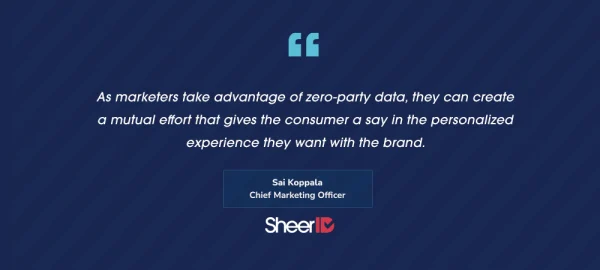SheerID Blog Post – How Marketers Can Use Zero-Party Data to Improve the Customer Experience

This article originally appeared as a Forbes Communication Council Post.
I’m a marketer. And like you, it’s been ingrained in me not to ask consumers for their data—because that sounds like friction. Anything that makes a consumer pause and question the brand’s intentions creates friction that can slow down the experience and kill the sale. Right? Not necessarily. Not everything we think is “friction” is bad—like asking consumers questions.
Ask Questions in a Time Of Zero-Party Data
Traditionally, marketers have shied away from asking anything of consumers out of fear of turning them away. But if the consumer doesn’t perceive it as friction, neither should you. It’s all about articulating the value the consumer will get by providing the data. As long as the consumer gets value—a better experience, product, or offer—they likely won’t see it as friction. This is the heart of zero-party data—consumers voluntarily provide information in exchange for an incentive or reward. Especially now, as brands face mounting restrictions around using third-party data, they should embrace zero-party data to better understand and connect with consumers. In my experience, strong emotional connections can help motivate customers to purchase. Asking questions that consumers want to answer can spark the start of a relationship—not the end, as many marketers have long assumed. Here are three scenarios where you can invite consumers to provide zero-party data.
Create a Better Discovery Experience
Consumers generally want to be able to find what they need faster. And one of the best ways to deliver on this expectation is through a quick survey or quiz. Ask a consumer about their preferences and then serve up the exact product or service they may be looking for. NARS Cosmetics, for example, uses a “lip shade finder quiz” that asks a consumer about their mood, beauty mantra, going-out look, and skin tone. Once the consumer enters their email, they get the results of the survey (although they can choose not to provide that information), including recommendations on lip color and other products. Other brands lean in more to the “personality” angle of a quiz by asking questions like, “What does your wine preference say about you,” “What kind of concert goer are you,” or “What is your parenting style?” In exchange for sharing information, the consumer can receive a faster, better search experience that’s fine-tuned to their preferences.

Deliver a Custom Product
In addition to asking questions to improve the discovery experience, you can also ask questions to inform the development of a custom product. In this case, the consumer willingly provides personal data in exchange for a slam-dunk product that is likely to meet their needs. Proven Skincare, for instance, invites consumers to “take the skin quiz” in order to create a personalized skincare routine. A consumer first answers a series of questions about their concerns (e.g., wrinkles, redness, or sensitivity), lifestyle (e.g., sleep or diet), and location, then provides their email. Proven immediately suggests a personalized skincare system. Strategies like these can be win-wins, especially for subscription companies whose business is built on customer loyalty.
Personalize an Offer
At the core, asking questions is about getting to know someone—what they want, what they like, and what they need. But it’s also about learning who they are. When people are part of a community—such as teachers or first responders or the military—they may feel a kinship and sense of belonging to that group; and they’ll likely appreciate it when brands acknowledge them. For example, one of my company’s clients—a travel brand—offers exclusive deals on all-inclusive beach vacations to veterans and active-duty service members after verifying their information through my company’s solution. It’s a simple exchange: ask the consumer for basic information like date of birth, profession, name, and email, and in return, give them a reward like a discount or VIP experience.
Conclusion
Whether it’s a salesperson asking better questions to close a deal or an employee asking questions of a colleague to build a stronger relationship, asking questions helps you get to know someone. Brands that understand this aren’t creating friction; they’re creating connection. And they’re making good on the promise of personalization. Brands have long perceived personalization as a one-way street where they “personalize” based on inferred data about the consumer. But as marketers take advantage of zero-party data, they can create a mutual effort that gives the consumer a say in the personalized experience they want with the brand. When brands do it right, asking questions can be a path to better personalization, better relationships and, ultimately, long-term loyalty. The opportunity is there. Now… What will you ask consumers in 2022?
